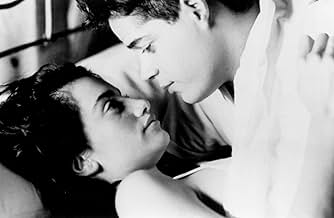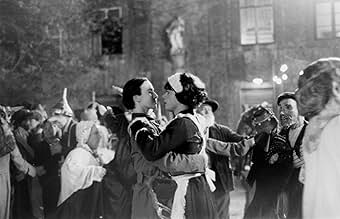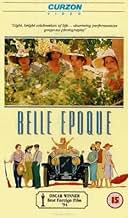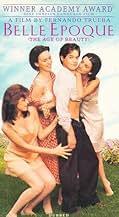IMDb-BEWERTUNG
7,1/10
11.862
IHRE BEWERTUNG
Ein Deserteur des spanischen Militärs aus dem Jahr 1931 findet sich auf einem einsamen Bauernhof wieder, bis die vier Töchter des Bauern zu Besuch kommen und er sich in sie alle verliebt.Ein Deserteur des spanischen Militärs aus dem Jahr 1931 findet sich auf einem einsamen Bauernhof wieder, bis die vier Töchter des Bauern zu Besuch kommen und er sich in sie alle verliebt.Ein Deserteur des spanischen Militärs aus dem Jahr 1931 findet sich auf einem einsamen Bauernhof wieder, bis die vier Töchter des Bauern zu Besuch kommen und er sich in sie alle verliebt.
- 1 Oscar gewonnen
- 25 Gewinne & 15 Nominierungen insgesamt
Joan Potau
- Paco
- (as Juan Potau)
Empfohlene Bewertungen
Hard to see why anyone would compare this unfavorably with Fellini or Bergman unless they only like those with dark and/or complicated scenarios.
This is, as others have pointed out, a rite-of-passage farce. It's funny even with the subtitles.
Essentially the young man beds -and falls momentarily in love with- every young female in an eccentric Spanish clan.
The human condition is first and foremost... no one hatching nefarious plots or playing off their agenda against the dark side.
And it's incredibly beautifully shot.
This is, as others have pointed out, a rite-of-passage farce. It's funny even with the subtitles.
Essentially the young man beds -and falls momentarily in love with- every young female in an eccentric Spanish clan.
The human condition is first and foremost... no one hatching nefarious plots or playing off their agenda against the dark side.
And it's incredibly beautifully shot.
The plot, this is a movie about a straggler that is taken in by a local Spanish elder who happens to have 4 very beautiful and very single daughters. In the next hour, the straggler ends up having relations with all four daughters. The side story of the Spanish civil war and the relationship between the 4 sisters and their parents is simple background to the main plot of sexual desire and the tension that becomes to obvious to hide. A beautiful cast of people, the ending is somewhat sad, but true. A nice film, and surprisingly, no nudity? Still, it is a nice "sexy" film.
Fernando Trueba's enchanting 'Belle Epoque' is a delightful little 'folktale' that is lyrical, sensual, hilarious, whimsical and human. Azcona's cleverly written screenplay is rich with wit, sarcasm and history. In addition to that the film also looks beautiful and authentic (compared to the overload of glossy look in a majority of films).
Set in a country farm, it tells the story of a young soldier (Jorge Sanz), a deserter, who escapes and finds solace at Manolo's (Fernando Fernán Gómez) house where he falls for his four daughters, the widow (Miriam Díaz-Aroca), the lesbian (Ariadna Gil), the belle (Maribel Verdú) and the virgin (Penélope Cruz). On the surface the story sounds may sound odd but it's splendidly quirky. It successfully avoids the 'cliches' that are so evident in many European films that make it to the so-called international platform begging for a best foreign language Oscar (even though 'Belle Epoque' won it in 1993).
The storytelling here, for one, feels very natural and not one scene looks forced. The editing smoothens things finely and the score is first rate as it gives 'Belle Epoque' that final whimsical touch.
All the actors do a superb job. Fernando Fernán Gómez is very likable as the patron of the family. Miriam Díaz-Aroca, Ariadna Gil, Maribel Verdú and Penélope Cruz are excellent as the stunning looking daughters. Jorge Sanz is great as the naive hero and Gabino Diego provides wonderful comic relief.
In the end, 'Belle Epoque' is a delicious combination of humour, music, sex, romance, self-discovery and adventure, a celebration of life itself.
Set in a country farm, it tells the story of a young soldier (Jorge Sanz), a deserter, who escapes and finds solace at Manolo's (Fernando Fernán Gómez) house where he falls for his four daughters, the widow (Miriam Díaz-Aroca), the lesbian (Ariadna Gil), the belle (Maribel Verdú) and the virgin (Penélope Cruz). On the surface the story sounds may sound odd but it's splendidly quirky. It successfully avoids the 'cliches' that are so evident in many European films that make it to the so-called international platform begging for a best foreign language Oscar (even though 'Belle Epoque' won it in 1993).
The storytelling here, for one, feels very natural and not one scene looks forced. The editing smoothens things finely and the score is first rate as it gives 'Belle Epoque' that final whimsical touch.
All the actors do a superb job. Fernando Fernán Gómez is very likable as the patron of the family. Miriam Díaz-Aroca, Ariadna Gil, Maribel Verdú and Penélope Cruz are excellent as the stunning looking daughters. Jorge Sanz is great as the naive hero and Gabino Diego provides wonderful comic relief.
In the end, 'Belle Epoque' is a delicious combination of humour, music, sex, romance, self-discovery and adventure, a celebration of life itself.
Wow, what a terrific movie. I didn't expect much. I'm watching the end at 4:40am in the morning, and wondering why I haven't seen this movie before. It has something that you'll only find in a Spanish film. A type of humor that is missing in American movies, or maybe, just doesn't work in English. I don't know. All I know is that the movie is tremendously humorous. The actors are all fantastic. Penelope Cruz is, well, Penelope Cruz, but otherwise the movie is wonderful. DO NOT MISS IT.
Comical (farce at times), deeply human movie about an army deserter who meets up with a kindly, old, artistic gent who offers him refuge. The deserter is packed up and ready to go, until the artist's four beautiful daughters arrive. This sets in motion a plot that will keep you laughing, dialogue that will keep you thinking and characters that will keep you entertained. The humor is not forced and the chuckle is at life's absurdities, politics, most of all, human nature. Momma's entrance into the story is unique and melodic, to say the least. The movie is kind of kooky and not a by-the-numbers flick, and a satisfying watch. Sidebar: It did get the Oscar nod for Best Foreign Film.
Wusstest du schon
- WissenswertesWhen accepting his Academy Award for Best Foreign Language Film, director (Fernando Trueba) said: "I would like to believe in God in order to thank him for this prize, but I only believe in (Billy Wilder), so... Thank you, Mr. Wilder!". Wilder himself reportedly phoned Trueba a few days later for acknowledgment and told him: "Hello Fernando, I'm God".
- PatzerAmalia sings "En un pais de fábula" from Pablo Sorozábal's zarzuela "La tabernera del puerto". The situation of the movie is in early 1930s, whereas this zarzuela was first staged in 1936.
- SoundtracksEn un país de fábula
(from La tabernera del puerto)
Written by Pablo Sorozábal (as Pablo Sorozabal), Guillermo Fernández Shaw and Federico Romero
Performed by Mary Carmen Ramírez
Top-Auswahl
Melde dich zum Bewerten an und greife auf die Watchlist für personalisierte Empfehlungen zu.
- How long is Belle Epoque?Powered by Alexa
Details
- Erscheinungsdatum
- Herkunftsländer
- Offizieller Standort
- Sprachen
- Auch bekannt als
- Belle Epoque
- Drehorte
- Arruda dos vinhos, Lissabon, Portugal(Quinta do Bulhaco: Manolo's estate at 38°56'55"N, 9°03'51"W)
- Produktionsfirmen
- Weitere beteiligte Unternehmen bei IMDbPro anzeigen
Box Office
- Bruttoertrag in den USA und Kanada
- 5.418.216 $
- Weltweiter Bruttoertrag
- 5.418.502 $
- Laufzeit1 Stunde 49 Minuten
- Sound-Mix
- Seitenverhältnis
- 2.35 : 1
Zu dieser Seite beitragen
Bearbeitung vorschlagen oder fehlenden Inhalt hinzufügen

Oberste Lücke
By what name was Belle Époque - Saison der Liebe (1992) officially released in Canada in French?
Antwort



































